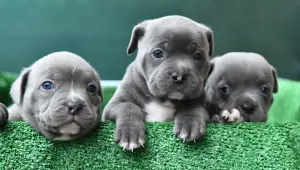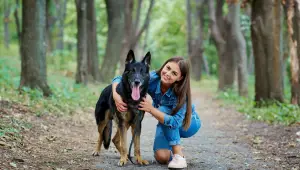When you are a cat owner, the idea of getting a dog may seem like a nightmare. You imagine your elegant feline friend being terrorized by a canine intruder, and you would do anything to prevent that from happening.
But what if there was a way for your cat and dog to get along? What if you could have the best of both worlds? Let’s have a look at which are the best dog breeds for cats to live with.
Table of Contents
ToggleContents of this article:
- Best dog breeds for cats.
- Best breed of dog to get along with cats.
- Dogs that are good with cats.
- Dog breeds to avoid with cats.
- Final words on best breed of dog to live with cats.
Best dog breeds for cats.
There are certain breeds and types of dogs that are more likely to get along with cats than others. These breeds tend to be gentle, patient, and tolerant. They are also typically quiet and calm, which can be a plus if you have a nervous or skittish cat.
It’s important to consider the breed’s original purpose when thinking about whether they may be a good match to live with a cat. This is why some breeds can be a bad choice.
Any breeds that are known as independent workers, triggered by movement or were bred to grab and shake small furry things until they stop moving are breeds to rule out!
Let’s have a look in more depth at the best breed of dog for cat owners and why.
Best breed of dog to get along with cats.
Some of the best breeds and types of dogs for cats include:
Scent hounds.
When most people think of cats and dogs, they usually imagine the two as natural enemies. However, there are plenty of examples of cats and dogs getting along just fine.
In fact, some scent hounds such as Bassetts, Beagles and Bloodhounds can make good partners for cats. The reason for this is that scent hounds are gentle by nature and tend to be very laid back. In addition, scent hounds are relatively low energy, so they’re not likely to chase a cat around or disturb its sleep.
When they aren’t working a scent, these dogs tend to be happy, affectionate and mellow, which are all qualities that make them excellent companions for cats.
Of course, every cat and dog is different, so it’s always important to introduce them slowly and see how they get along. But if you’re looking for a canine companion for your feline friend, a scent hound may be worth considering.
Toy dog breeds.
Toy dogs such as Bichon Frise, Cavalier King Charles Spaniel, Maltese, Papillion and Pugs are a good match for cats because of their temperament and size. Toy breeds are small dogs and most are known for being gentle and cheerful.
Many toy dogs are low-energy dogs that don’t require a lot of exercise. This makes them a good match for lazy cats who like to lounge around all day.
So if you’re looking for a small, gentle dog that can get along with your cat, a toy breed may be the perfect match.
Gundog breeds.
Despite some of these breeds having high working drive, the majority are friendly and gentle. This makes gundog breeds such as Golden Retrievers, Labrador Retrievers, Poodles, Pointers, Setters and Spaniels good candidates for cat-friendly homes.
Our own working line Springer Spaniels have lived with free-ranging chickens and rabbits after careful introductions, even when they were introduced as adult dogs rather than puppies, so they can be very gentle with small furries given the right training.
Gundogs are bred to work closely with their handlers and are highly trainable, so with careful introductions and boundaries, they can make a great addition to your household if you have cats.
Large working breeds.
These dogs tend to have low prey drive so if you’re looking for a big dog that can get along with your cat, consider one of the large working breeds such as Great Pyrenees, Newfoundland, Bernese Mountain Dogs, St Bernards, Boxers and Mastiffs.
These dogs are bred for jobs like guarding sheep and pulling carts, so they tend to be gentle and calm by nature. And since they’re usually pretty laid-back, they’re not likely to bother a lazy cat who just wants to sleep all day!
Bulldogs and French Bulldogs.
One breed of dog that can make a particularly good match for a cat is the bulldog. Bullies are known for their gentle nature, and they are often content to lounge around the house all day. This laid-back attitude can be a good match for a busy or active cat.
And since they are relatively low energy, they won’t be constantly trying to play with a disinterested cat. So if you’re looking for a canine companion for your feline friend, consider a bulldog.
Dogs that are good with cats.
If you’re looking for a dog that is good with cats, there are certain breeds that are more likely to get along. Scent hounds, toy dogs, bulldogs, gundogs, and livestock guardian breeds are all known for being tolerant and gentle around cats.
These are just a few of the breeds that tend to do well with cats. But remember, every dog is an individual, and even dogs of the same breed can have very different personalities. So, it’s important to get to know your dog’s personality before you introduce him or her to your cat. You will still need to introduce the two animals slowly and carefully, but these are some of the best breeds of dog for cats.
Dog breeds to avoid with cats.
There are some breeds of dogs that are less likely to do well with cats. These breeds tend to be high-energy, hunting dogs with a strong prey drive. They may view your cat as a potential target, and they may not have the patience or gentleness required to live peacefully with a feline friend.
Some of the breeds and types of dog that you should avoid with cats include:
Terriers.
Terriers are not a good match for cats because of their hunting instincts. Terriers were bred to hunt small animals, and they have a strong desire to chase and kill anything that moves.
This instinct can be difficult to suppress, even with training. Consequently, terriers are more likely to view cats as potential prey, rather than as companions.
In addition, terriers are often quite energetic, and their high energy levels can be overwhelming for cats. Cats prefer to live in calm environments, and they may become stressed or intimidated by a hyperactive dog.
For these reasons, it is generally best to keep cats and terriers separate.
Sight hounds.
Sight hounds such as greyhounds, whippets, borzoi and saluki, were bred to hunt by sight. This means that they are very prone to chasing anything that moves, including cats.
The Sighthounds were developed for keen eyesight, speed, and agility in order to detect moving prey, pursue it, and immobilize it. In addition, sight hounds are generally much larger than cats, and their powerful jaws can easily injure or kill a cat.
For these reasons, sight hounds are not a good match for cats. If you have a sight hound and a cat, it is important to keep them separated to avoid any accidents.
Primitive breeds.
Primitive dogs such as Huskies, Malamutes and Chows more closely resemble wolves or foxes than most domestic dogs, with a pointed muzzle, wedge-shaped head, upright ears, almond-shaped eyes and a long-curved tail.
While primitive breeds are generally good-natured dogs, they are not a particularly good match for cats. This is because they have a high prey drive and are prone to chasing small animals.
As they are far less removed from their wolf ancestors than many other breeds of domestic dogs, they are more likely to act on their instincts. Primitive breeds tend to be more independent and aloof, so are considered less trainable than some breeds.
In addition, many of these breeds are large and powerful, which can be dangerous for a small cat.
Herding dogs.
Herding dogs such as Collies, Shepherds and Australian Cattle Dogs have a strong instinct to herd animals. This means that they may try to herd your cat, which can be very stressful for both of them.
In addition, herding dogs are often high energy, and their constant movement can be overwhelming for a cat. For these reasons, it is generally best to avoid keeping herding dogs and cats together.
Final words on best breed of dog to live with cats.
It is important to think about the breed’s original purpose when you are considering the best breed of dog to have with cats. For example, some breeds might not be a good choice because they are independent workers who can’t help chasing things or breeds that were meant to grab and shake little furry animals until they stop moving.
It is possible to find a dog that is compatible with your cat. But it will take some effort on your part. You will need to do your research and find a breed that is known for being good with cats. You will also need to introduce the two animals slowly and carefully, making sure to monitor their interactions closely.
With the right breed of dog and the proper introductions, your cat and dog can become the best of friends.
Other relevant articles:







